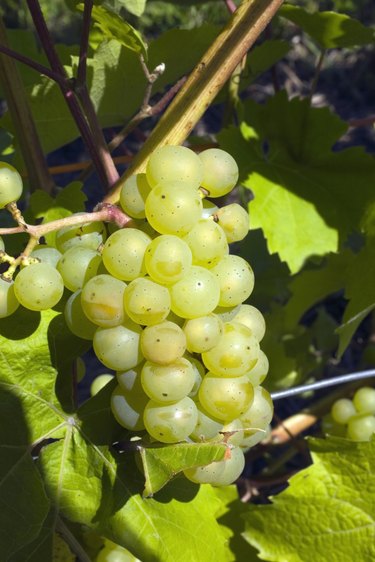
Unlike a vegetarian diet, a vegan diet does not include dairy or eggs. This diet is ideal for people who need to lower their fat intake or who just want to optimize their health. Vegan diets concentrate on the intake of grains, vegetables and fruits, which all help to ward off health problems. This is especially important for women with polycystic ovary syndrome, or PCOS, who have increased risks of developing certain conditions.
Insulin Control
Video of the Day
Women with polycystic ovary syndrome -- PCOS -- have an increased level of insulin in the blood that causes symptoms such as facial hair growth and may contribute to type-2 diabetes. This can be made worst by eating foods that cause rapid rises in the insulin such as simple carbohydrates and sugar. These women are often told to go on medications such as metformin to control insulin levels. Aside from medication, however, eating a low-glycemic diet can help reduce insulin levels. It is possible to be a vegan and adhere to the low-glycemic diet. A low-GI diet consists of eating foods that cause little changes to insulin levels such as whole grains, vegetables and fruit.
Video of the Day
Ovulation Restoration
Some women with PCOS have problems ovulating due to an imbalance in estrogen and progesterone. This is due to the oversecretion of the sex hormones in the pituitary gland. Vegan diets encourage the consumption of vitamin- and mineral-rich whole foods that can help the condition tremendously. According to Women's Fitness, consuming iron-rich foods can lower the incidence of ovulatory infertility. Although heme iron is found in meat and fish, vegans can obtain iron from nonheme sources such as green vegetables, fruits, fortified bread and grain products. Eating foods that contain vitamin C assists the absorption of iron.
Regulating Menses
Because of the imbalance that these women have in estrogen and progesterone, they often do not menstruate regularly. This can be made worse by the weight gain that these women experience as well. Following a vegan diet can help reduce weight significantly, which in most cases will restore regular menstrual cycles. According to Women's Health, a reduction of 10 percent in weight can help minimize symptoms as these. Legumes, whole wheat, oatmeal and brown rice can aid in weight loss due to their high fiber content, according to MayoClinic.com.
Reducing Future Complications
According to Women's Health, 50 percent of women with PCOS will develop type-2 diabetes or pre-diabetes by the age of 40. Women's Health states that one of the ways to prevent this health complication is to eat healthy foods. Vegan foods such as spinach, broccoli, brown rice, high-fiber cereal and low-sugar drinks can help reduce this risk.